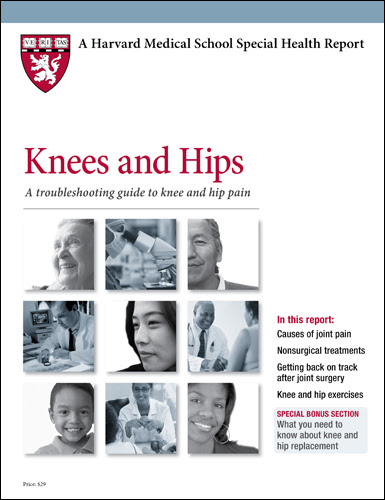
Exercising with knee or hip pain
.jpg)
Image: iStock
If you're experiencing knee or hip pain, you're not alone. Nearly everyone will experience knee or hip pain at some point in their lives. When this kind of pain strikes, doctors are likely to recommend the least invasive treatment to alleviate pain and encourage healing.
Along with applying ice or heat and taking nonsteroidal anti-inflammatory drugs (NSAIDs) to relieve pain and inflammation, exercise is one of the best things you can do for a sore or injured joint. If you like to exercise regularly but need to give your hip or knee a rest while an injury heals, here are some exercises you can do in the meantime. You can combine these exercises to create a routine lasting 30 minutes or longer:
Get your copy of Knees and Hips
|
- floor exercises, including abdominal curls, crunches, push-ups, or leg lifts
- exercises that target the upper body, including repeated lifting of hand weights in different directions
- gentle yoga
- swimming
- routines involving an exercise ball, including stretches, abdominal curls, or leg lifts
For more information on alleviating knee and hip pain, buy Knees and Hips, a Special Health Report from Harvard Medical School.
Joint replacement — finding the right medical team |

Image: iStock
Joint replacement is a complex procedure, and finding the right surgeon and hospital can make a big difference in your outcome. In general, you're likely to have a better result and fewer complications if your surgeon performs the operation frequently (at least 100 times per year) and operates in a hospital where these procedures are commonplace. Don't be surprised if this rules out the most convenient hospital for your location.
Your orthopedist, rheumatologist, or primary care physician, or a friend who has undergone successful joint replacement, may be able to recommend a specific surgeon. But keep in mind that your insurer may restrict you to certain specialists or require a larger copayment if you go outside your plan.
When you meet for an initial consultation, try asking the following questions to be sure you're working with an experienced surgeon:
- Are you board-certified in orthopedic surgery?
- Are you fellowship-trained?
- How often do you perform this surgery?
- What kind of results would you expect for someone in my condition?
- May I speak with any of your patients who have had this surgery?
- What complications occur most frequently, and how do you deal with them?
- Do you usually work with a particular physical therapist or rehabilitation center?
Much of your experience in the hospital and afterward will center on physical therapy, so it is worth your while to investigate this ahead of time.
Look for a physical therapist who is used to working with people who've had joints replaced. A good physical therapist or rehabilitation center
- individualizes your rehab program in consultation with your doctor
- finds ways you can gain muscle strength even while joint damage limits your activity
- helps keep you going even through some discomfort
- helps you reach your goals (whether that means just walking comfortably or returning to a favorite sport).
For more information on joint replacement, buy Knees and Hips, a Special Health Report from Harvard Medical School.

Knees and Hips
Featured content:
| • | Knees in motion |
| • | Hips on the ball |
| • | Testing for knee and hip problems |
| • | Nonsurgical treatments for knees and hips |
| • | Special section: Knee and hip replacement |
| • | ... and more! |
Click here to read more »


































No hay comentarios:
Publicar un comentario